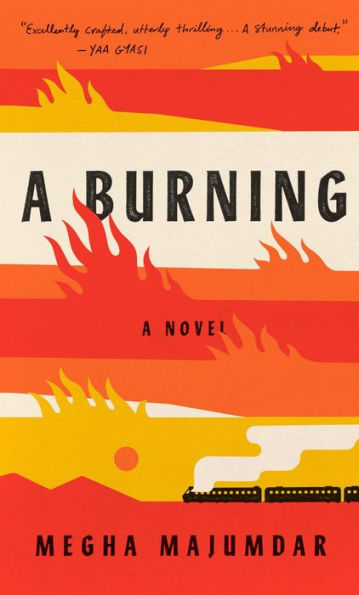When Megha Majumdar’s debut novel, A Burning (Knopf, 2020), was released in early June, many remarked on how prescient it feels. The book follows three characters in India whose lives intertwine after a terrible event. But it’s also about politics and power, specifically the insidious ways in which a charismatic figurehead can seduce people into believing in, even idolizing, their person and power. But one of the most thought-provoking things about A Burning is its depiction of how the worst of humanity plays out on large and small scales, and with it the best and most interesting parts, too.
 A Burning is a complex story, and managing complexity is Majumdar’s strong suit. The book is cinematic and expertly paced, and its characters envelop the reader into their worlds, even though each chapter is short. Majumdar’s day job embodies complexity, too — in her role as book editor at Catapult, her work involves seeing a book through the long and multi-faceted process from acquisition to publication. She went to graduate school for social anthropology at Johns Hopkins University after graduating from Harvard.
A Burning is a complex story, and managing complexity is Majumdar’s strong suit. The book is cinematic and expertly paced, and its characters envelop the reader into their worlds, even though each chapter is short. Majumdar’s day job embodies complexity, too — in her role as book editor at Catapult, her work involves seeing a book through the long and multi-faceted process from acquisition to publication. She went to graduate school for social anthropology at Johns Hopkins University after graduating from Harvard.
Catapult is an independent press started by Electric Literature cofounder Andy Hunter, veteran editor Pat Strachan, and Elizabeth Koch (yes, that Koch) in 2015, and it merged with Counterpoint and Soft Skull Press in 2016. It publishes fiction and literary nonfiction that regularly earn awards and accolades. Its digital arm includes a prestigious literary magazine and a roster of online and in-person classes taught by established and emerging writers and editors. Catapult also maintains an online community for all of its paying members and class alums. Its bi-coastal status and multi-pronged business model (and its seed money from Koch) have helped the publisher maintain a strong foothold in the industry, especially for an indie press.
Even as Majumdar promotes her own book, she continues to work with her clients and thus glimpses into the future. Here, she talks about how COVID-19 has and hasn’t changed her work, state oppression, curiosity in storytelling, and hope for the future.
* * * * *
Sarah Neilson: You basically have two jobs right now, working as an editor at Catapult and promoting your book. How has your work at Catapult changed in the past few months, as a result both of COVID and of your book launch?
Megha Majumdar: Catapult has had offices in different places and employees living all around the country. We’ve always had this culture of video calls and people calling in. So we’ve been pretty nimble with moving to work from home. The systems have been able to adapt really quickly. And with publishing my book, honestly, I’m figuring it out. It has been much busier than I anticipated it would be. It’s been a lot to do publicity here in the US but also for Canada and Australia and India at the same time. I’ve been very grateful for the attention, especially right now. [But I’m] just figuring it out.
SN: What does a workday look like for you right now?
 MM: It’s so varied. I might be bidding on a book, which means that I have a manuscript that I’m trying to acquire. I was just on the phone with an author talking about part of their descriptive copy, which is the description of the book that goes on the jacket. I was discussing with another author about people that we can reach out to for blurbs for their book.
MM: It’s so varied. I might be bidding on a book, which means that I have a manuscript that I’m trying to acquire. I was just on the phone with an author talking about part of their descriptive copy, which is the description of the book that goes on the jacket. I was discussing with another author about people that we can reach out to for blurbs for their book.
It’s just a lot of keeping different projects moving forward on their own schedules and timelines and making sure that I’m able to respond thoughtfully to the different questions around each book at each stage. You’re looking to acquire a new manuscript, you’re also looking at making galleys for books that you already have, you are thinking about how to support publicity and marketing for books that will come up soon. So it’s a lot of that. And then adding to the mix stuff for my book. It’s been very helpful that I have the support of a stellar team. At Catapult, my colleagues are incredibly supportive and encouraging, and at Knopf my publicist, Gabrielle Brooks, is brilliant and is helping me schedule everything, helping secure a lot of opportunities and open a lot of doors. So it’s a lot of different things to juggle, but I’m definitely doing it from a place of gratitude.
SN: How is the press fairing under COVID? Has it changed in terms of how many titles you can acquire or how you go about the acquisition process or the editing process?
MM: We’ve definitely adjusted in practical ways, like sending PDF and digital galleys to some people rather than physical galleys to everybody. But in many ways working in publishing right now feels very hopeful to me because you are looking to next year or the year beyond that. You’re working on 2021 books, 2022 books, and there is this inherent optimism and hopefulness because your timeline is so focused on the future. So yeah, I would say that we’re moving forward with the same enthusiasm and energy. I think over the past few months I’ve been bidding on just as many books as I would in any other time and just doing what I can to keep boosting the work of writers.
SN: I actually wanted to ask you about the future because publishing does work on such a long timeline. What do you imagine in the future for Catapult, or the literary world in general over the next few years?
MM: I see my work very much as making space for writers to pursue their curiosity and tell the kind of complex, nuanced, surprising stories, whether that’s fiction or nonfiction, that they want to tell. That goal hasn’t changed. I think there is hunger for complex stories and that’s what we’re working towards.
SN: To kind of get a little bit more specific about your book, how have COVID and the recent uprisings against police and state violence in the U.S. affected your book launch, and the way you think about your book launch, especially given that there are so many parallels between the state oppression in the book and what’s happening in the U.S.?
 MM: I worked so hard on my book and I’m so proud of it. And at the same time, I recognize that it’s launching into a moment where there are people’s lives at stake. Huge questions about the future of this country are require our response. And so I’m definitely holding those two truths in mind. This moment is bigger than my book, for sure. And it has been very eerie to see how I started writing my novel several years ago, but in a very similar mood of paying attention to the ways in which the state oppressive systems operate upon certain groups of people — and now the book is launching into a similar moment where there is such examination and there is such attention paid to these discriminatory oppressive systems that we live under.
MM: I worked so hard on my book and I’m so proud of it. And at the same time, I recognize that it’s launching into a moment where there are people’s lives at stake. Huge questions about the future of this country are require our response. And so I’m definitely holding those two truths in mind. This moment is bigger than my book, for sure. And it has been very eerie to see how I started writing my novel several years ago, but in a very similar mood of paying attention to the ways in which the state oppressive systems operate upon certain groups of people — and now the book is launching into a similar moment where there is such examination and there is such attention paid to these discriminatory oppressive systems that we live under.
SN: What are your thoughts on what is original writing at the moment? What kinds of stories are you excited about reading and writing?
MM: I always get excited by books with political stakes, books which I feel like are rising from and speaking to the world. Books that are saying something about injustice. I love big ambitious books in that vein. And I’m always interested in reading stories that are complex. One thing that really excites me is complexity. I love when a story holds contradictions and doesn’t try to impose a tidy narrative logic upon what might be a difficult, messy reality. I love to see writers telling complex stories without simplifying them in any way. That’s part of what I reach for in my writing, too. I hope I’ll be able to write a second book that is complex in that way.
SN: Where do you get your inspiration from? Whether it’s for work, or your own writing, or just life in general. Where are you finding hope or joy?
MM: A lot of the nourishment for A Burning came from reading the news and paying attention to news, so I think good journalism fuels my work. Even though I am a novelist, I learn so much from very careful journalism. Maybe that has something to do with inspiration. And in terms of hope and joy, I think it’s so heartening to see resistance movements, the uprisings that we are in the middle of right now. In India, too, there have been a lot of women-led resistance movements. People coming out to protest who never really saw themselves as politically active or protesters. And then things like neighborhood mutual aid funds that are springing up and neighbors helping neighbors get what they need. I think there’s such hope and joy in how people are turning to each other and speaking up about what’s unacceptable and doing what they can to help each other.